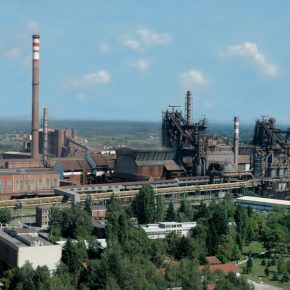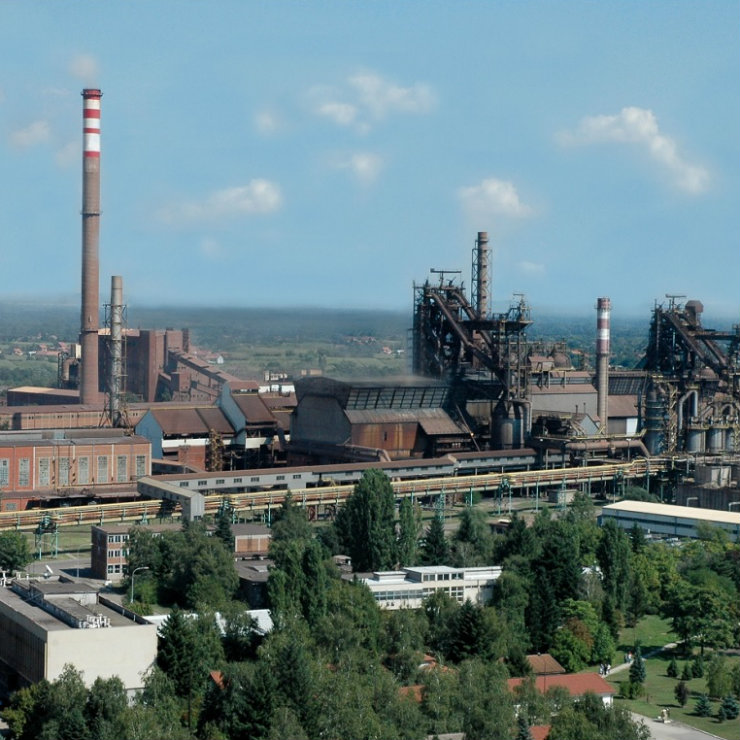
Steel plant in Smederevo (HBIS GROUP Iron & Steel)
The center of Chinese activity is Serbia. It is in Belgrade, where the Bank of China, the 4th biggest bank in the world according to the founding capital, opened its branch office in February 2017, serving the Balkan region. China plans to have an investment deal with the Serbian government concerning the infrastructural projects, including the motorway Beograd-Bar and the arrival of the Chinese telecommunication giant Huawei. These investments should rise up to some EUR2,2bn. It involves the investments in textile industry (Everrest Production/HNC LLC in Ruma, EUR15m; Bestresources International in Ćuprija, EUR3,9m), car manufactures (Johnson Electric in Niš, Obrenovac and Sombor, EUR65m; Mei Ta in Obrenovac, EUR60m), retail (Diplom/Belmax Center in Zemun, EUR32m), and electronic industry (Tesla Solar in Raška, EUR400,000).
Steel was the king
But the biggest investment is in Hesteel Smederevo, the steel production factory in central Serbia. The first idea was to invest some EUR46m in this pride of Serbian steel industry. It was founded in 1913 and became almost a legend of industry in Serbia. During the times of communist Yugoslavia, Smederevo steel industry was enlarged and heavily subsidized, and the government effectively made a classic communist heavy industry enterprise. The steel was not particularly good, but the communist centralism covered the constant losses with inflation rates and new foreign debts.
The steel factory was economically ruined by the international sanctions against Serbia in 1990s, when the Milošević regime waged wars against its neighbors Croatia and BiH. Socialist Party’s favorite, Dušan Matković, became the factory’s director and after the Dayton Agreement raised it to the top Serbian export industry. Although claimed to be a very successful businessman, Matković’s management ended up with USD1,7bn of debt. After the democratic changes in Serbia, London club and Paris club cleared some parts of this debt, but the Smederevo steel factory still had USD500m debt to the state.
The government sold the factory to the US Steel in 2003 for USD23m. That was a cunning American decision, as the European steel factories were selling all their products to China, and the European market went hungry for steel. However, although they have got the factory for a great price, Americans couldn’t raise profit. For every ton of steel produced, they have generated a loss of USD100. Thus, they’ve returned the factory to the state for USD1 (yes, one American dollar). By far, it is the same story for many other former Yugoslavian steel giant, like in Sisak in Croatia; Zenica in Bosnia and Herzegovina, and Nikšić in Montenegro.
Friendship with China
Everything might change with the arrival of Chinese. In May this year, then still a prime minister and now president of Serbia Mr Aleksandar Vučić, went with an official visit to the People’s Republic of China. Vučić visited the Tangshan area, some 180 km east of Beijing. The Serbian media branded it immediately as “the Chinese Smederevo”, given its heavy steel industry there. Vučić paid a visit to the Hasteel and Tangsteel factory and afterwards sat with the Communist Party representatives in that region. He also praised the One Road, One Belt Initiative.
The Serbian head of state went to Tangshan to visit the owner of the Smederevo Steel factory. Hesteel Group bought the steel factory in Serbia last year, with a promise to invest at least EUR300m and keep all its 5,000 workers. Last year alone, the Chinese group invested already USD120m and expects to reach this year production of two million tons. The CEO of Hesteel Group, Mr Yu Yong announced another USD120m in 2017 for reconstruction, new equipment and technology. This year they expect a profit of EUR20m. A large corporation can easily manage this kind of investments, as it is one of the biggest steel producers in Asia, with annual production of 50 million tons, and income of USD43,7bn in 2015.
Serbia badly needs investments and social security by providing secure jobs. The evident pragmatism of Vučić is a showcase of this fact. On the one hand, he is as a pro-European politician, but on the other hand, he praises Russia and China, confirming the Serbian welcome to the One Road, One Belt Initiative.
EU is not happy
Meantime, the EU has already pointed out that all the Chinese investments are not in accordance with the EU standards, such as the lack of transparency, public tenders and international standards of social protection and environment. Brussels is not going to confirm the business rules in Belgrade and warn this may delay the opening of negotiation chapters concerning Serbia and other countries. But, given the fact of slow approach of Balkan countries to the EU, local governments look for short-term stability in their countries, proclaiming the arrival of Chinese capital as a great return of the heavy industry.
There is a long tradition of heavy industry as a backbone of local economies. Although heavily subsidized in the communist times, these factories were the essence of local prosperity in the former Yugoslavia. None of the Western investors are keen to invest in the failed industries of the old type, though. However, this type of industry is not so different from the Chinese mass production and, what interests Chinese entrepreneurs, Balkan countries are much closer to the potential markets. At the same time, Chinese political interest is to support the regional European perspective.
It is a win-win situation for China. In contrast to Russia and Turkey, Beijing supports the regional governments in their European integration, as it needs a sufficient level of political stability in order to fulfil its economic interests. Still, Chinese will support the state-run companies and heavy industry more than private market-oriented projects. It means we can expect further politicization of Chinese investments and agreements, which is in opposition to the European models of open and transparent calls for investments.
Generally, local politicians regard China as a solid source of economic growth and an excellent partner of industrial restructuring in the Balkans. All international financial institutions ask for privatization of inefficient industries (mostly heavy industries from the communist era). The main reason for this approach is an idea that private interest can inspire the entrepreneurial activity, although many industries in the Balkans are evidently the remnants of old times. Chinese approach this topic with another logic, supporting and subsidizing the heavy industries and protecting the jobs. By guaranteeing jobs and social stability, Chinese can clearly influence the local decision making, doing everything to create a terminal of the One Road, One Belt Initiative in the Balkans.
At present, the EU is warning regional countries they should keep to the European norms and rules, hoping it will detract their governments from doing business with China. The Chinese are not easily scared, though. Standardization process, in the end, should bring a higher quality of Chinese economical offer. But the problem also lies in the Balkan governments themselves. Role models, such as Poland, should be used as a path forward in their economy growth. A clear Polish orientation to the European and Euro-Atlantic integration means also total acceptance of the institutions, rules and social norms that make the core of economic prosperity. Poles privatized large industrial complexes, but they have also revived the open market, with fewer taxes and debts, convertible currency, and liberalized trade. It is a clear blueprint for the Balkans, but the parochial political culture is still a norm there.
Vedran Obućina is an analyst and a journalist specializing in the Croatian and Middle East domestic and foreign affairs. He is the Secretary of the Society for Mediterranean Studies at the University of Rijeka and a Foreign Affairs Analyst at The Atlantic Post.


